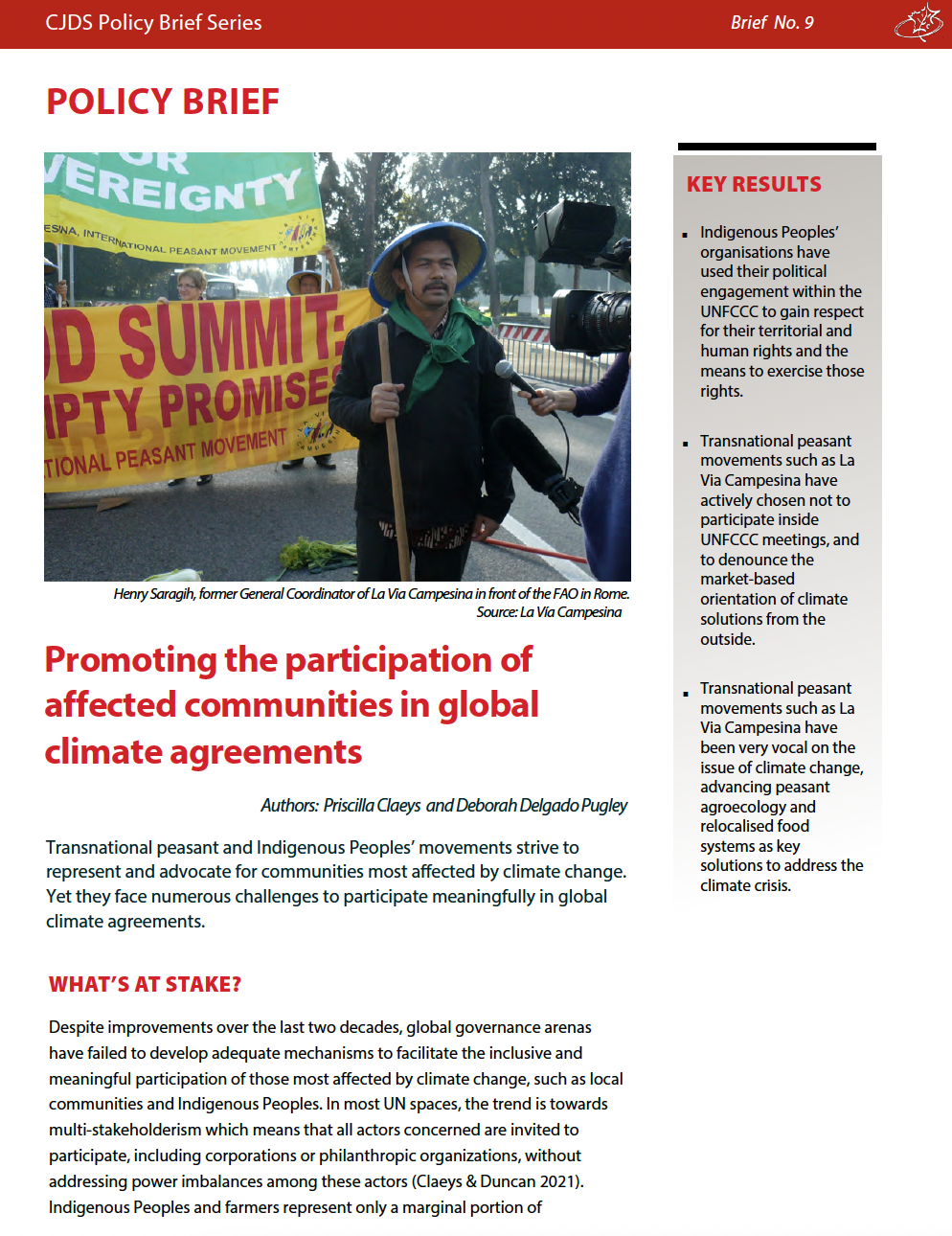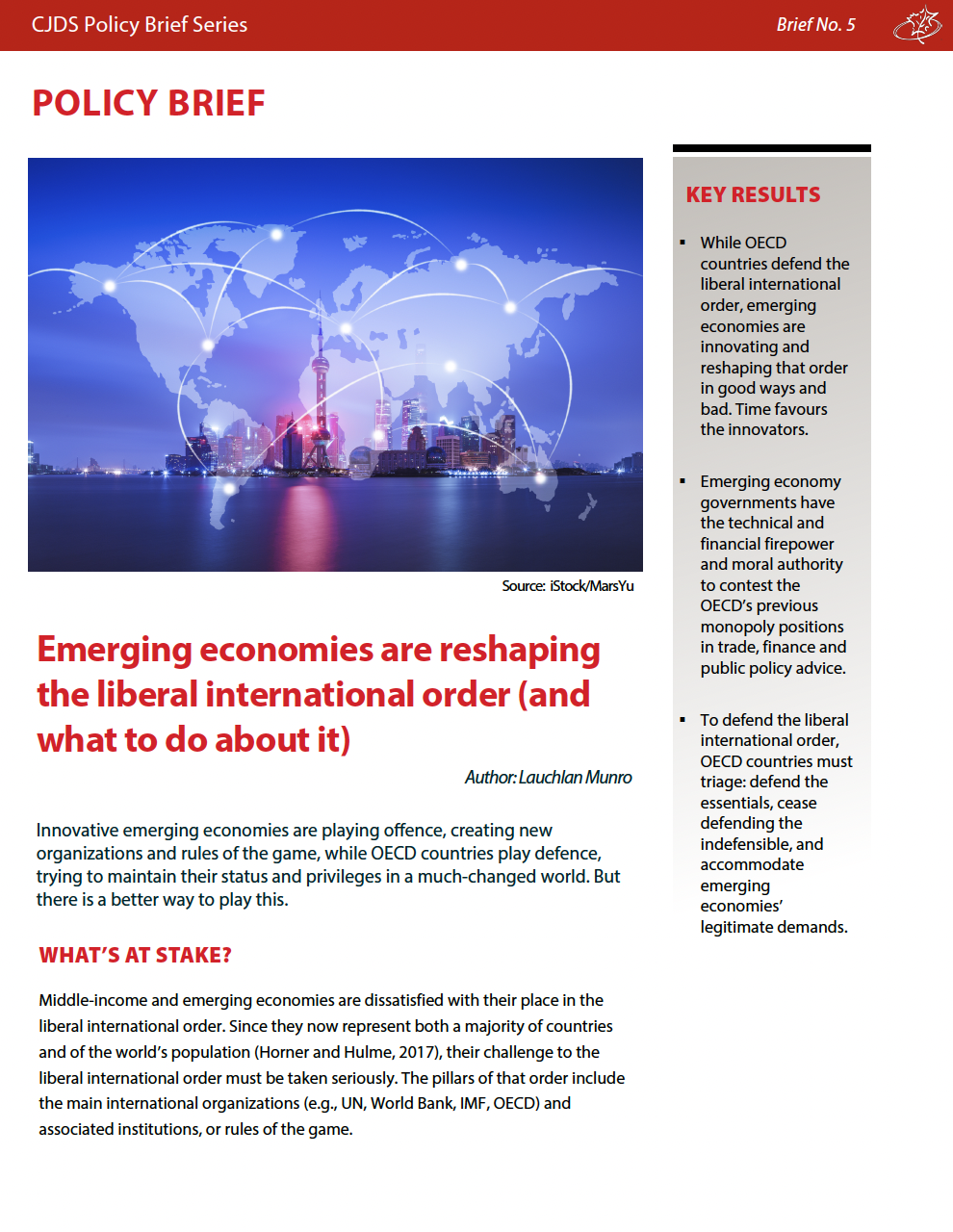CJDS Policy Briefs
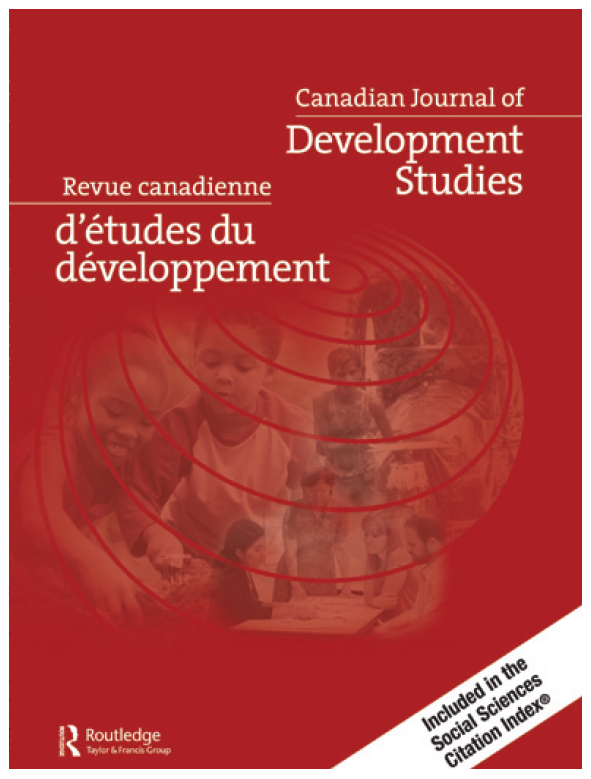
In 2019-2020, as part of CASID’s ongoing efforts to connect development researchers and policy makers, we launched the CJDS Policy Brief Series to highlight recent research published in the Canadian Journal of Development Studies (CJDS).
Working in collaboration with the International Assistance Research and Knowledge Division (PVA) of Global Affairs Canada (GAC), the briefs below (available in both English and French) provide a snapshot of analysis and policy recommendations derived from recently published CJDS articles that cover a broad spectrum of development issues.
Brief #9 *New*
Promoting the participation of affected communities in global climate agreements
Priscilla Claeys and Deborah Delgado Pugley
Highlight: Transnational peasant and Indigenous People's movements strive to represent and advocate for communities most affected by climate change. Yet they face numerous challenges to participate meaningfully in global climate agreements.
Citation: Claeys, P. and D. Delgado Pugely. 2021. "Promoting the participation of affected communities in global climate agreements." CJDS Policy Brief Series No. 9. Canadian Journal of Development Studies, Canada.
Link to original CJDS article: https://doi.org/10.1080/02255189.2016.1235018
Brief #8 *New*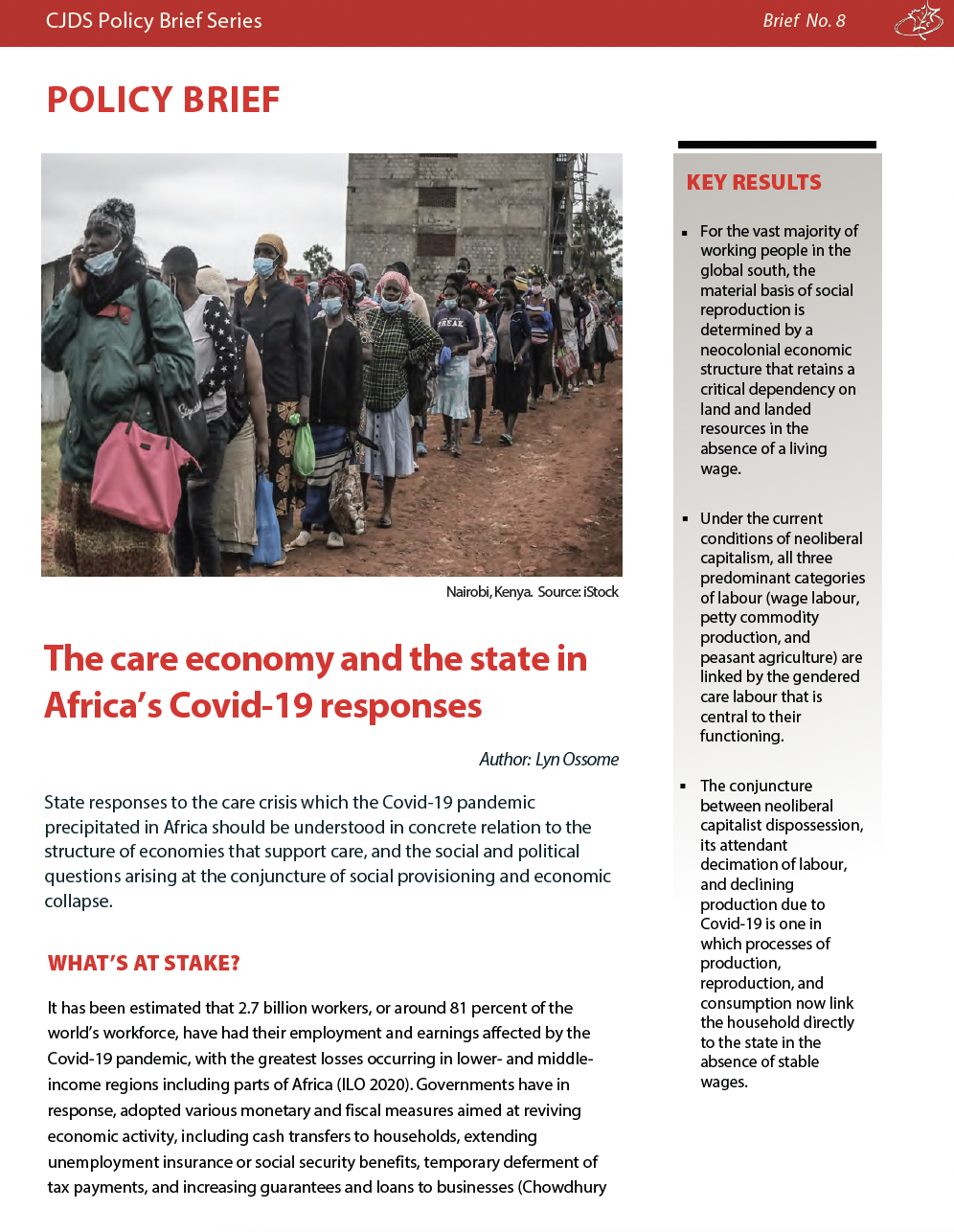
The care economy and the state in Africa's Covid-19 responses
Lyn Ossome
Highlight: State responses to the care crisis which the Covid-19 pandemic precipitated in Africa should be understood in concrete relation to the stucture of economies that support care, and the social and political questions arising at the conjuncture of social provisioning and economic collapse.
Citation: Ossome, L. 2021. “The care economy and the state in Africa's Covid-19 responses.” CJDS Policy Brief Series No. 8. Canadian Journal of Development Studies, Canada.
Link to original CJDS article: https://doi.org/10.1080/02255189.2020.1831448
Brief #7 *New*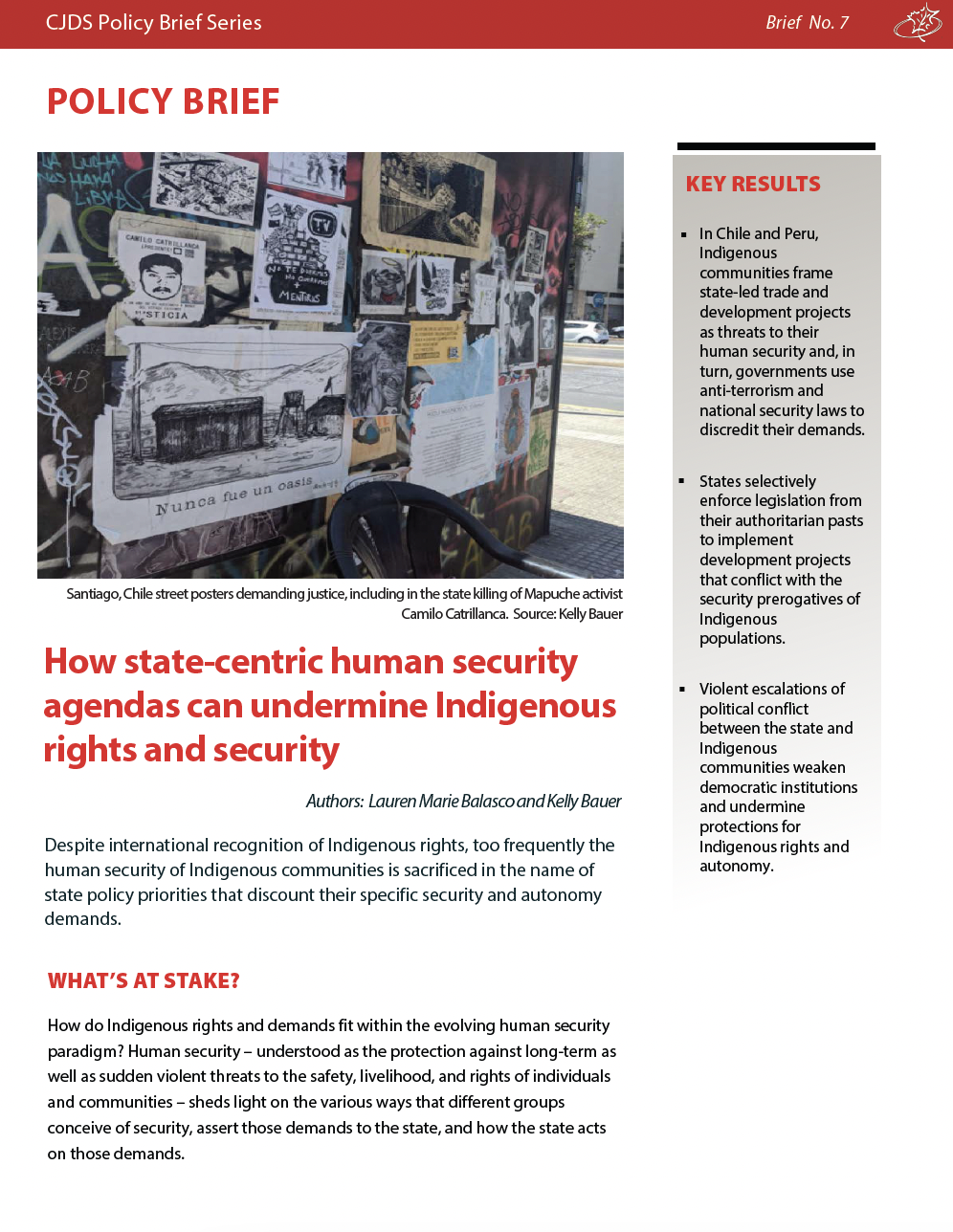
How state-centric human security agendas can undermine Indigenous rights and security
Lauren Marie Balasco and Kelly Bauer
Highlight: Despite international recognition of Indigenous rights, too frequently the human security of Indigenous communities is sacraficed in the name of state policy priorities that discount their specific security and autonomy demands.
Citation: Balaso, L. and K. Bauer. 2021. “How state-centric security agendas can undermine Indigenous rights and security.” CJDS Policy Brief Series No. 7. Canadian Journal of Development Studies, Canada.
Link to original CJDS article: https://doi.org/10.1080/02255189.2020.1781407
Brief #6
Moving beyond industrialized food systems to build a just and resilient future
Fiorella Picchioni, June Y. T. Po, and Lora Forsythe
Highlight: Food systems thinking often does not address issues of unequal labour and power. To tackle inequalities and strengthen actions to achieve just and resilient food systems, a holistic approach centered on work and care relations is proposed.
Citation: Picchioni, F., Po, J. Y. T., and L., Forsythe. 2021. “Moving beyond productivism and instrumental arguments to increase food systems resilience” CJDS Policy Brief Series No. 6. Canadian Journal of Development Studies, Canada.
Link to original CJDS article: https://doi.org/10.1080/02255189.2020.185876
Brief #5
Emerging economies are reshaping the liberal international order (and what to do about it)
Lauchlan Munro
Highlight: Innovative emerging economies are playing offence, creating new organizations and rules of the game, while OECD countries play defence, trying to maintain their status and privileges in a much-changed world. But there is a better way to play this.
Citation: Munro, L. T. 2021. “Emerging economies are reshaping the liberal international order (and what to do about it).” CJDS Policy Brief Series No. 5. Canadian Journal of Development Studies, Canada.
Link to original CJDS article: https://doi.org/10.1080/02255189.2017.1394273
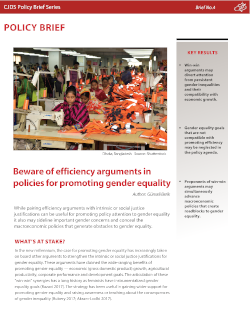 Brief #4
Brief #4
Beware of Efficiency Arguments in Policies for Promoting Gender Equality
Günseli Berik
Highlight: While pairing efficiency arguments with intrinsic or social justice justifications can be useful for promoting policy attention to gender equality it also may sideline important gender concerns and conceal the macroeconomic policies that generate obstacles to gender equality.
Citation: Berik, G. 2020. “Beware of Efficiency Arguments in Policies for Promoting Gender Equality.” CJDS Policy Brief Series. No. 4. Canadian Journal of Development Studies, Canada.
Link to original CJDS article: https://doi.org/10.1080/02255189.2017.1377063
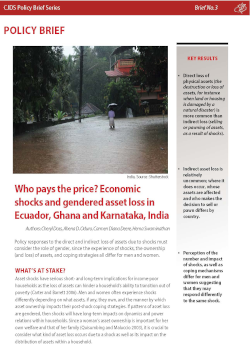 Brief #3
Brief #3
Who Pays the Price? Economic Shocks and Gendered Asset Loss in Ecuador, Ghana and Karnataka, India
Cheryl Doss, Abena Oduro, Carmen Diana Deere, Hema Swaminathan, William Baah-Boateng, and Suchitra J.Y.
Highlight: Policy responses to the direct and indirect loss of assets due to shocks must consider the role of gender, since the experience of shocks, the ownership (and loss) of assets, and coping strategies all differ for men and women.
Citation: Doss, C., Oduro, A.D., Deere, C.D., Swaminathan, H., Baah-Boateng, W., and J.Y., Suchitra. 2020. “Who Pays the Price? Economic Shocks and Gendered Asset Loss in Ecuador, Ghana and Karnataka, India." CJDS Policy Brief Series. No 3. Canadian Journal of Development Studies, Canada.
Link to original CJDS article: https://doi.org/10.1080/02255189.2017.1316244
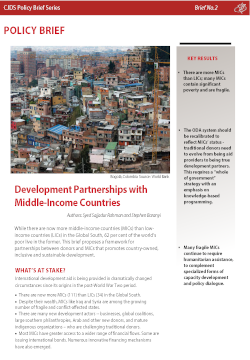 Brief #2
Brief #2
Development Partnerships with Middle-Income Countries (MICs)
Syed Sajjadur Rahman and Stephen Baranyi
Highlight: This brief proposes a framework for partnerships between donors and MICs that promotes country-owned, inclusive and sustainable development.
Citation: Rahman, S.S., and Baranyi, S. 2020. “Development Partnerships with Middle-Income Countries (MICs).” CJDS Policy Brief Series. No. 2. Canadian Journal of Development Studies, Canada.
Links to original CJDS articles:
https://doi.org/10.1080/02255189.2017.1409617
https://doi.org/10.1080/02255189.2017.1394275
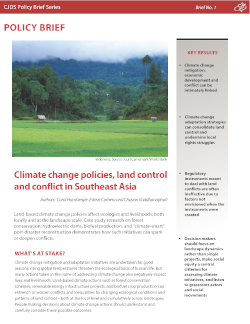 Brief #1
Brief #1
Climate Change Policies, Land Control and Conflict in Southeast Asia
Carol Hunsberger, Esteve Corbera, and Chayan Vaddhanaphuti
Highlight: Land-based climate change policies affect ecologies and livelihoods, both locally and at the landscape scale. Case study research on forest conservation, hydroelectric dams, biofuel production, and “climate-smart” post-disaster reconstruction demonstrates how such initiatives can spark or deepen conflicts.
Citation: Hunsberger, C., Corbera, E., and Vaddhanaphuti, C. 2020. “Climate Change Policies, Land Control and Conflict in Southeast Asia.” CJDS Policy Brief Series. No. 1. Canadian Journal of Development Studies, Canada.
Link to original CJDS article: https://doi.org/10.1080/02255189.2017.1343413



